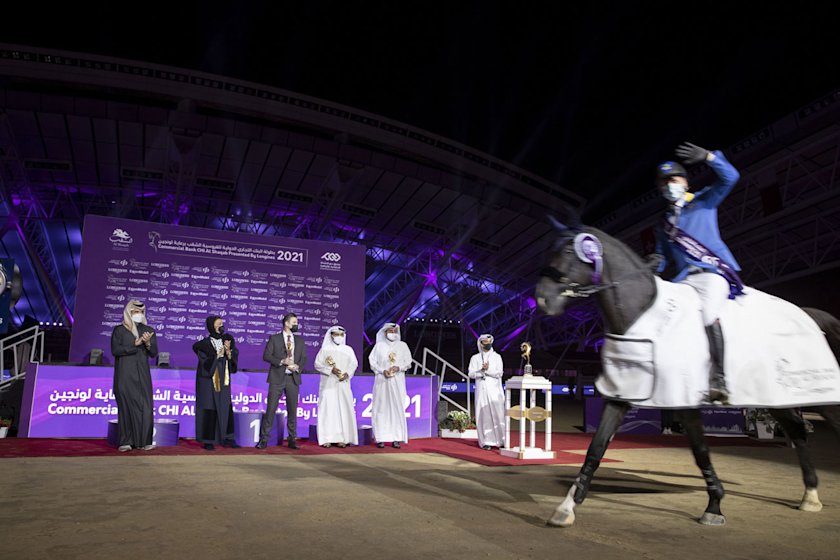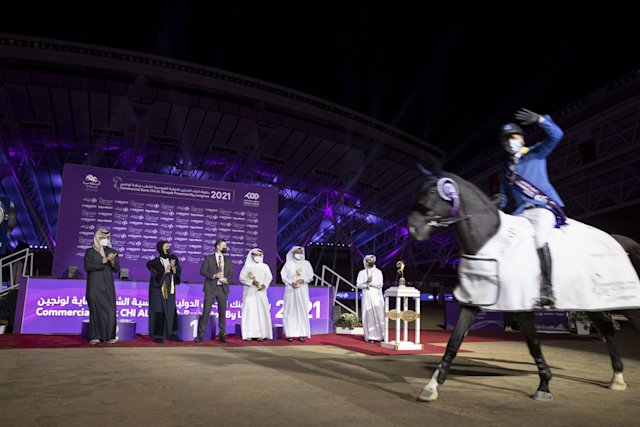The Heartbeat of Society
Strong, cohesive families are one of the pillars of society – but amid shifting generational trends and social challenges, the family unit is not immune to pressures and instability.
It was Qatar Foundation’s (QF) belief in the central role of the family in sustainable social progress that led to its establishment of the Doha International Family Institute (DIFI), a global policy and advocacy institute whose remit is to advance knowledge on Arab families and promote policies that strengthen them.
Through its research, ability to foster dialogue, and role as an advocate, DIFI addresses the core issues and challenges affecting Arab families. And these include marriage.
In February, DIFI’s ‘Marriage: Formation and Constituents of Stability’ conference brought together almost 1,000 people from around the world to discuss critical factors surrounding marriage in the modern age – from rising costs and declining rates, to the need to balance the demands of work and family.
Strong, cohesive families are one of the pillars of society – but amid shifting generational trends and social challenges, the family unit is not immune to pressures and instability.
It was Qatar Foundation’s (QF) belief in the central role of the family in sustainable social progress that led to its establishment of the Doha International Family Institute (DIFI), a global policy and advocacy institute whose remit is to advance knowledge on Arab families and promote policies that strengthen them.
Through its research, ability to foster dialogue, and role as an advocate, DIFI addresses the core issues and challenges affecting Arab families. And these include marriage.
In February, DIFI’s ‘Marriage: Formation and Constituents of Stability’ conference brought together almost 1,000 people from around the world to discuss critical factors surrounding marriage in the modern age – from rising costs and declining rates, to the need to balance the demands of work and family.
A QF member’s international conference tackled the challenges facing families in the Arab world – as QF also placed the focus on health and wellbeing, and sustainability.
DIFI’s focus on the Arab family is built around:
- Advocacy
- Research
- Policy
At the opening of #DIFIQatar's virtual conference, Marriage: Formation & Constituents of Stability, @UN DSG, Ms. @AminaJMohammed commended @DIFI_Qatar role as an important partnrer & advocate for family oriented policies & programs in support of the #2030_Agenda & #SDGs pic.twitter.com/CrskxBSl5i
— Qatar Mission to UN 🇶🇦 (@QatarAtUN) February 23, 2021
Relationships of Respect
Over the course of the three-day conference, experts emphasized the continued importance of marriage in today’s world, explored the difficulties that place a strain on marriages and their broader impact on families and society, and call for policies, programs, and practices that preserve the institution of marriage.
Topics ranged from socioeconomic challenges to marriage, support systems, and the future of marriage policies, to the impact of technology, conflict, and COVID-19 on marital relationships and families. Among the speakers was Her Excellency Sheikha Hind bint Hamad Al Thani, Vice Chairperson and CEO of Qatar Foundation, who said: “It’s important that family relationships are built in an equal way where each individual is respected, and that includes our children.
“We need to respect that we bring our children up to have a voice as well, and they need to feel they have this security within their home.”
The event also saw DIFI present its book on ‘The State of Marriage in the Arab World’, designed to help guide action to address marriage challenges in the Arab world.
Over the course of the three-day conference, experts emphasized the continued importance of marriage in today’s world, explored the difficulties that place a strain on marriages and their broader impact on families and society, and call for policies, programs, and practices that preserve the institution of marriage.
Topics ranged from socioeconomic challenges to marriage, support systems, and the future of marriage policies, to the impact of technology, conflict, and COVID-19 on marital relationships and families. Among the speakers was Her Excellency Sheikha Hind bint Hamad Al Thani, Vice Chairperson and CEO of Qatar Foundation, who said: “It’s important that family relationships are built in an equal way where each individual is respected, and that includes our children.
“We need to respect that we bring our children up to have a voice as well, and they need to feel they have this security within their home.”
The event also saw DIFI present its book on ‘The State of Marriage in the Arab World’, designed to help guide action to address marriage challenges in the Arab world.
We need to respect that we bring our children up to have a voice as well, and they need to feel they have this security within their home.
Around 1,000 people from around the world participated in the DIFI conference, which hosted 18 sessions
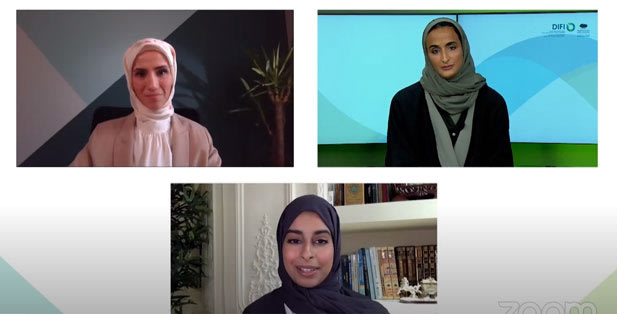

Sending a Mental Health Message
Another essential building block of a strong society is health and wellbeing – physical and mental.
And as Qatar marked National Sport Day, QF drove home the message of how vital it is for people to protect their mental health, as a series of virtual activities allowed people to embrace the spirit of the annual national celebration of sport from their own homes amid the pandemic.
Online fitness classes, sessions showcasing ability-friendly sporting opportunities, and inspirational talks – which included experts explaining how exercise and mental health are interconnected – encouraged the community of Qatar to embrace physical activity as a pathway to both a healthy and happy life.
Continuing the sporting theme, football fans arriving at the Education City Stadium – housed at QF – for FIFA Club World Cup Qatar 2020™ matches were invited to engage with QF’s Students of Change campaign, which empowers people to recognize how they can be a diver of positive change. Among the QF-organized activities on the stadium route was a graffiti wall on which fans penned the change they want to see in the world.
Another essential building block of a strong society is health and wellbeing – physical and mental.
And as Qatar marked National Sport Day, QF drove home the message of how vital it is for people to protect their mental health, as a series of virtual activities allowed people to embrace the spirit of the annual national celebration of sport from their own homes amid the pandemic.
Online fitness classes, sessions showcasing ability-friendly sporting opportunities, and inspirational talks – which included experts explaining how exercise and mental health are interconnected – encouraged the community of Qatar to embrace physical activity as a pathway to both a healthy and happy life.
Continuing the sporting theme, football fans arriving at the Education City Stadium – housed at QF – for FIFA Club World Cup Qatar 2020™ matches were invited to engage with QF’s Students of Change campaign, which empowers people to recognize how they can be a diver of positive change. Among the QF-organized activities on the stadium route was a graffiti wall on which fans penned the change they want to see in the world.
A Sustainable Standard
They’re inflatable, they’re on a global quest to raise awareness about the effects of climate change…and, in February, they were a star turn at QF.
The Anooki – two giant Inuit-inspired characters – travel the world with their immersive light show after their home was melted by global warming, educating people about the need for everyone to play their part in shaping a more sustainable world. During their six-day stay at Education City, they attracted 7,500 visitors.
And QF’s own role as a standard-bearer for sustainability was illustrated as the 2015 building – the organization’s HQ – was awarded a top regional sustainability ranking from the Gulf Organisation for Research & Development, for showing how a building can be operated in an eco-friendly way, from its energy and water use to its waste management approach.
“Even buildings which have the highest standards of sustainable design can only truly be environmentally-friendly if they are continually operated as a green building,” said Hamad Mohamed Al Kuwari, Executive Director of City Operations, QF, following the award of the gold-rated Global Sustainability Assessment System Operations Certificate.
They’re inflatable, they’re on a global quest to raise awareness about the effects of climate change…and, in February, they were a star turn at QF.
The Anooki – two giant Inuit-inspired characters – travel the world with their immersive light show after their home was melted by global warming, educating people about the need for everyone to play their part in shaping a more sustainable world. During their six-day stay at Education City, they attracted 7,500 visitors.
And QF’s own role as a standard-bearer for sustainability was illustrated as the 2015 building – the organization’s HQ – was awarded a top regional sustainability ranking from the Gulf Organisation for Research & Development, for showing how a building can be operated in an eco-friendly way, from its energy and water use to its waste management approach.
“Even buildings which have the highest standards of sustainable design can only truly be environmentally-friendly if they are continually operated as a green building,” said Hamad Mohamed Al Kuwari, Executive Director of City Operations, QF, following the award of the gold-rated Global Sustainability Assessment System Operations Certificate.
7,500 people attended the Anooki shows at Education City
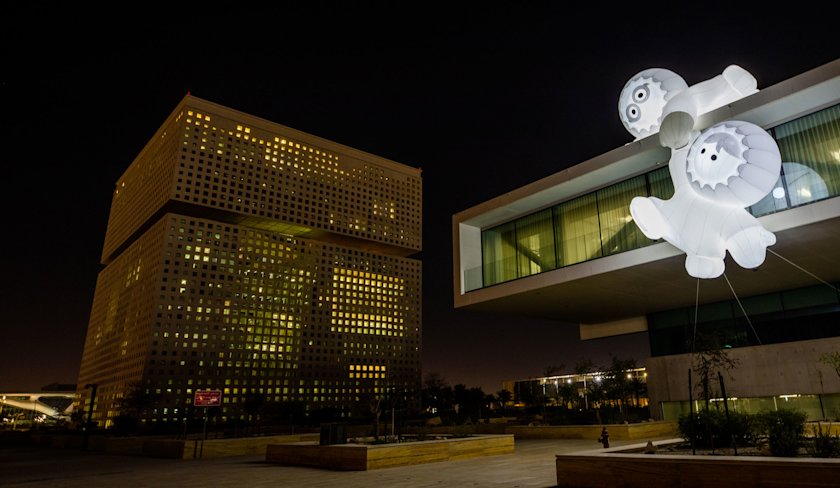
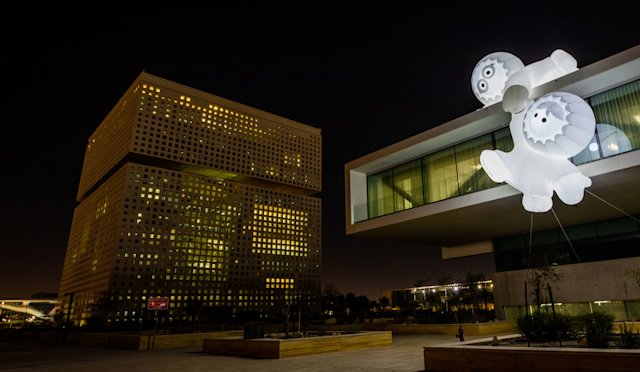
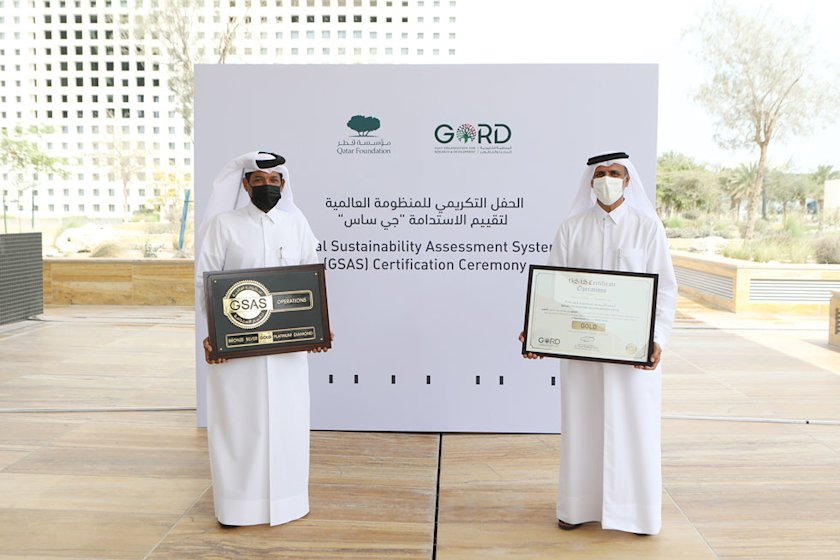
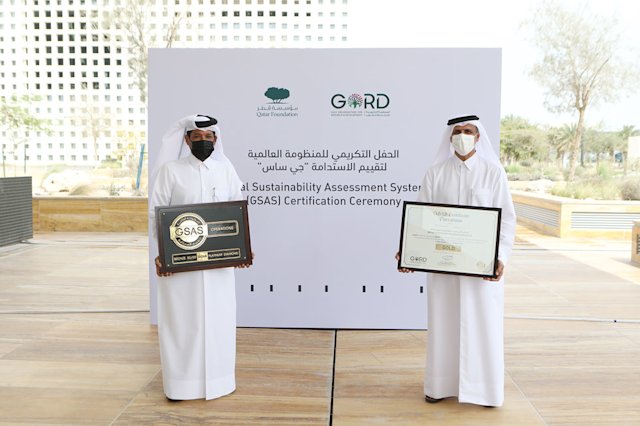
Partnering for Personalized Healthcare
The goal of advancing precision medicine from laboratory to bedside in Qatar was advanced in February as QF announced a partnership with a major international pharmaceutical company that is also creating new pathways to careers in the pharma industry for Qatari students.
The three-year collaboration between Qatar Foundation Research, Development and Innovation and Roche will develop a repeatable process for translating the outcomes of precision medicine research into mainstream clinical use in Qatar, with its first stage focusing on how genetic markers can guide diagnoses and treatment decisions for diseases such as cancer.
Six-month life-sciences placements with Roche will also be offered to Qatari postgraduate students in molecular biology from QF’s Hamad Bin Khalifa University (HBKU) and Qatar University, through a pilot scheme.
“QF is determined to be at the vanguard of precision medicine development, for people in Qatar and for the wider world,” said Dr. Richard O’Kennedy, Vice President for Research, Development, and Innovation, QF. “We see this collaboration as a perfect platform for continuing this crucial work.”
The goal of advancing precision medicine from laboratory to bedside in Qatar was advanced in February as QF announced a partnership with a major international pharmaceutical company that is also creating new pathways to careers in the pharma industry for Qatari students.
The three-year collaboration between Qatar Foundation Research, Development and Innovation and Roche will develop a repeatable process for translating the outcomes of precision medicine research into mainstream clinical use in Qatar, with its first stage focusing on how genetic markers can guide diagnoses and treatment decisions for diseases such as cancer.
Six-month life-sciences placements with Roche will also be offered to Qatari postgraduate students in molecular biology from QF’s Hamad Bin Khalifa University (HBKU) and Qatar University, through a pilot scheme.
“QF is determined to be at the vanguard of precision medicine development, for people in Qatar and for the wider world,” said Dr. Richard O’Kennedy, Vice President for Research, Development, and Innovation, QF. “We see this collaboration as a perfect platform for continuing this crucial work.”
QF is determined to be at the vanguard of precision medicine development, for people in Qatar and for the wider world
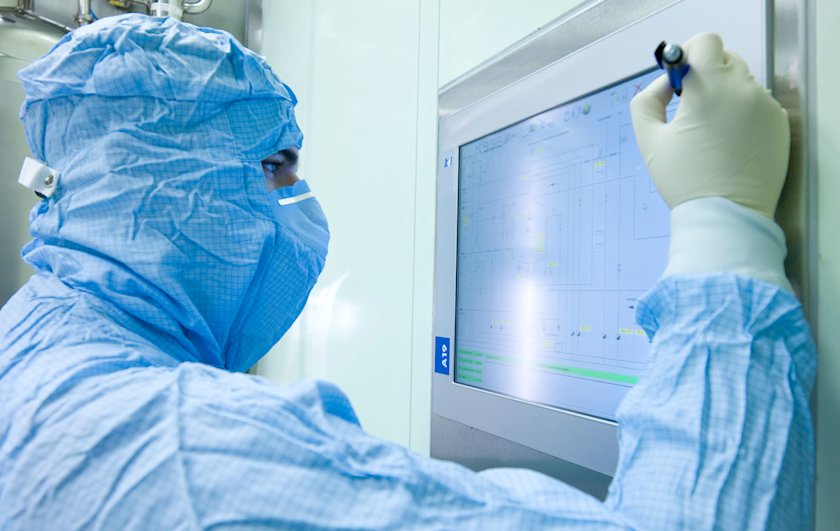
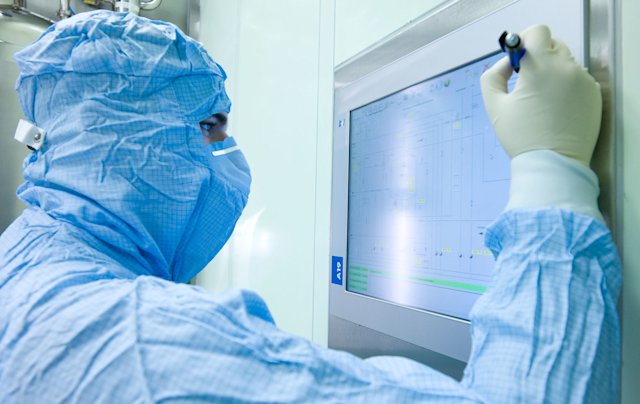
A Global View on Vaccines
As the development and rollout of COVID-19 vaccines raised hopes of an end to the pandemic, Qatari and global health experts highlighted why people, not jabs, are the key to defeating the virus, on QF’s Education City Speaker Series global dialogue platform.
Held in collaboration with the World Innovation Summit for Health, QF’s global healthcare initiative, the event saw World Health Organization (WHO) representatives and leaders of public health and vaccine science call for vaccine equity, warning “nobody is safe until everybody is safe”.
“In order for us to control the pandemic and gradually start to go back toward normal life, every member of every community in every country should feel they have an active role in fighting COVID-19, and that they have an individual responsibility,” said Dr. Abdullatif Mohamed Al Khal, Chairman of Qatar’s National Pandemic Preparedness Committee and Deputy Chief Medical Officer at Hamad Medical Corporation.
And Dr. Ahmed Al Mandhari, WHO Regional Director for the Eastern Mediterranean, said: “Rich countries have the full capability to make sure their citizens are vaccinated, but we should not let those in low-resource countries go without vaccination.”
As the development and rollout of COVID-19 vaccines raised hopes of an end to the pandemic, Qatari and global health experts highlighted why people, not jabs, are the key to defeating the virus, on QF’s Education City Speaker Series global dialogue platform.
Held in collaboration with the World Innovation Summit for Health, QF’s global healthcare initiative, the event saw World Health Organization (WHO) representatives and leaders of public health and vaccine science call for vaccine equity, warning “nobody is safe until everybody is safe”.
“In order for us to control the pandemic and gradually start to go back toward normal life, every member of every community in every country should feel they have an active role in fighting COVID-19, and that they have an individual responsibility,” said Dr. Abdullatif Mohamed Al Khal, Chairman of Qatar’s National Pandemic Preparedness Committee and Deputy Chief Medical Officer at Hamad Medical Corporation.
And Dr. Ahmed Al Mandhari, WHO Regional Director for the Eastern Mediterranean, said: “Rich countries have the full capability to make sure their citizens are vaccinated, but we should not let those in low-resource countries go without vaccination.”
Every member of every community in every country should feel they have an active role in fighting COVID-19, and that they have an individual responsibility
Many thanks to @QF and @WISHQatar for organizing this event, and to my colleagues at the @WHO and @HMC_Qatar for an important discussion on the role of vaccines in ending the pandemic. https://t.co/l0GgyjR75x
— Jerome Kim (@drjeromekim1) February 25, 2021
Research for Resilience
From the start of the COVID-19 pandemic, experts and entities across QF have played their part in supporting the health, social, and economic resilience of Qatar, as well as producing new knowledge that can benefit the region and the world.
This continued into 2021, as, in the face of unprecedented demand for medical resources, Dr. Luluwah Al-Fagih, Assistant Professor in Engineering Management and Decision Sciences at HBKU’s College of Science and Engineering, developed a game theory-based model capable of being used to manage stocks of critical personal protective equipment.
Andrew Edward and Abdullah Shaar – students at QF partner university Carnegie Mellon University in Qatar – unveiled their analysis of tweets to assess the pandemic’s impact on shipments to the GCC, presenting their findings at an international information systems conference.
And researchers from Sidra Medicine – QF’s leading women’s and children’s hospital and medical research hub – published a study on how antibodies respond to “common cold” coronaviruses, involving over 1,000 people, which can support the design of vaccines and antiviral antibody therapies.
From the start of the COVID-19 pandemic, experts and entities across QF have played their part in supporting the health, social, and economic resilience of Qatar, as well as producing new knowledge that can benefit the region and the world.
This continued into 2021, as, in the face of unprecedented demand for medical resources, Dr. Luluwah Al-Fagih, Assistant Professor in Engineering Management and Decision Sciences at HBKU’s College of Science and Engineering, developed a game theory-based model capable of being used to manage stocks of critical personal protective equipment.
Andrew Edward and Abdullah Shaar – students at QF partner university Carnegie Mellon University in Qatar – unveiled their analysis of tweets to assess the pandemic’s impact on shipments to the GCC, presenting their findings at an international information systems conference.
And researchers from Sidra Medicine – QF’s leading women’s and children’s hospital and medical research hub – published a study on how antibodies respond to “common cold” coronaviruses, involving over 1,000 people, which can support the design of vaccines and antiviral antibody therapies.
HBKU’s College of Science and Engineering offers 13 graduate programs
Over 1,000 people participated in Sidra Medicine’s antibodies study
Expanding a Unique Health Hub
Meanwhile, the expansion and evolution of Sidra Medicine’s healthcare services and research capacity continued in February.
Marking International Childhood Cancer Day, a team of Sidra clinicians and researchers launched a pediatric cancer biorepository pilot scheme aimed at developing personalized cancer therapies for patients, with Dr. Wouter Hendrickx, Principal Investigator of Sidra’s Pediatric Cancer Omics Lab, saying: “We believe that, in the long term, this project will pave the way for personalized precision medicine for each pediatric cancer patient in Qatar.”
Sidra also established Qatar’s first pediatric-focused Movement Disorders Clinic, designed to address conditions such as spasticity (uncontrollable muscle stiffness) and dystonia (which causes involuntary jerking and twisting movements) in children and young people who have not responded to other medications or therapy.
And the hospital’s Women’s Services grew with the unveiling of an Aesthetic Surgery and Medicine Clinic, headed by leading plastic, aesthetic, and reconstructive surgeon Dr. Chiara Botti, who said: “Women’s wellness and aesthetic goes hand in hand with their mental and physical wellbeing.”
Meanwhile, the expansion and evolution of Sidra Medicine’s healthcare services and research capacity continued in February.
Marking International Childhood Cancer Day, a team of Sidra clinicians and researchers launched a pediatric cancer biorepository pilot scheme aimed at developing personalized cancer therapies for patients, with Dr. Wouter Hendrickx, Principal Investigator of Sidra’s Pediatric Cancer Omics Lab, saying: “We believe that, in the long term, this project will pave the way for personalized precision medicine for each pediatric cancer patient in Qatar.”
Sidra also established Qatar’s first pediatric-focused Movement Disorders Clinic, designed to address conditions such as spasticity (uncontrollable muscle stiffness) and dystonia (which causes involuntary jerking and twisting movements) in children and young people who have not responded to other medications or therapy.
And the hospital’s Women’s Services grew with the unveiling of an Aesthetic Surgery and Medicine Clinic, headed by leading plastic, aesthetic, and reconstructive surgeon Dr. Chiara Botti, who said: “Women’s wellness and aesthetic goes hand in hand with their mental and physical wellbeing.”
We believe that, in the long term, this project will pave the way for personalized precision medicine for each pediatric cancer patient in Qatar
Sidra Medicine:
- Provides tertiary healthcare for women and children
- Conducts biomedical research
- Offers medical education
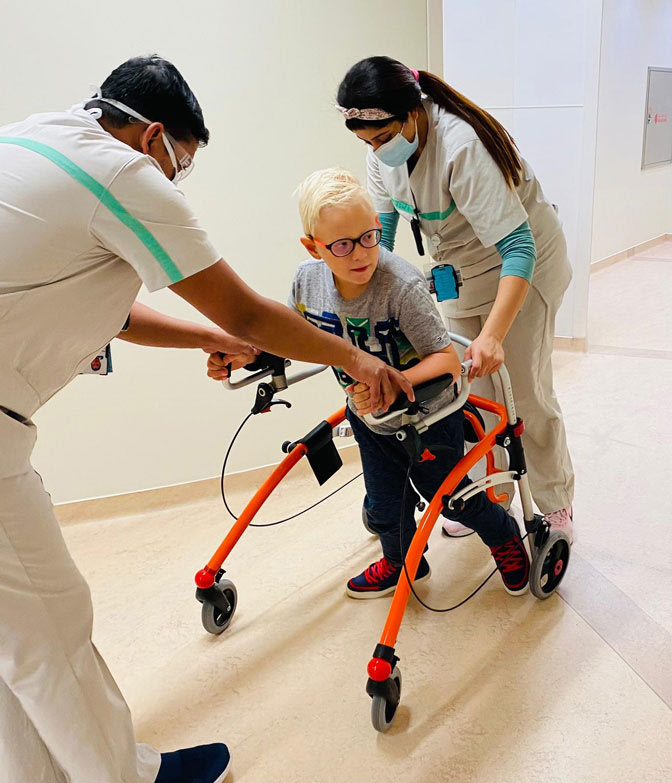
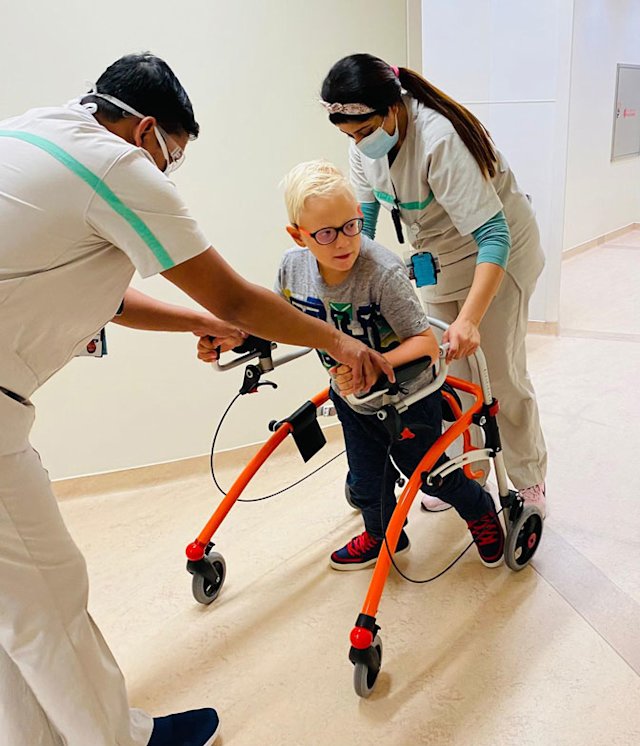
Bringing School and University Together
With schools and universities standing side by side at QF’s Education City, the range of opportunities for real-world learning that brings pre-university and higher education together is vast.
An example of this came as students from QF school Qatar Academy for Science and Technology (QAST) learned about underwater robotics through the Engineering Heroes academic enrichment program run by QF partner university Texas A&M University at Qatar (TAMUQ).
The program focused on the science and technology of remotely operated vehicles (ROVs) for ocean exploration, used in the oil and gas industry, with QAST student Ahmad Al-Mannai saying: “We learned how to be precise in our sketches and design, we learned to work in a team, and our plan is to make a simple ROV that is able to move underwater.”
“We are educating the next generation of engineering leaders in Qatar,” said Dr. César Octavio Malavé, Dean of TAMUQ. “We must begin attracting Qatar’s best and brightest young students to engineering at a young age, and programs like Engineering Heroes are a fun and innovative way to introduce science and engineering concepts to young students.”
With schools and universities standing side by side at QF’s Education City, the range of opportunities for real-world learning that brings pre-university and higher education together is vast.
An example of this came as students from QF school Qatar Academy for Science and Technology (QAST) learned about underwater robotics through the Engineering Heroes academic enrichment program run by QF partner university Texas A&M University at Qatar (TAMUQ).
The program focused on the science and technology of remotely operated vehicles (ROVs) for ocean exploration, used in the oil and gas industry, with QAST student Ahmad Al-Mannai saying: “We learned how to be precise in our sketches and design, we learned to work in a team, and our plan is to make a simple ROV that is able to move underwater.”
“We are educating the next generation of engineering leaders in Qatar,” said Dr. César Octavio Malavé, Dean of TAMUQ. “We must begin attracting Qatar’s best and brightest young students to engineering at a young age, and programs like Engineering Heroes are a fun and innovative way to introduce science and engineering concepts to young students.”
We are educating the next generation of engineering leaders in Qatar
81 students are enrolled at QAST in the 2021-22 academic year
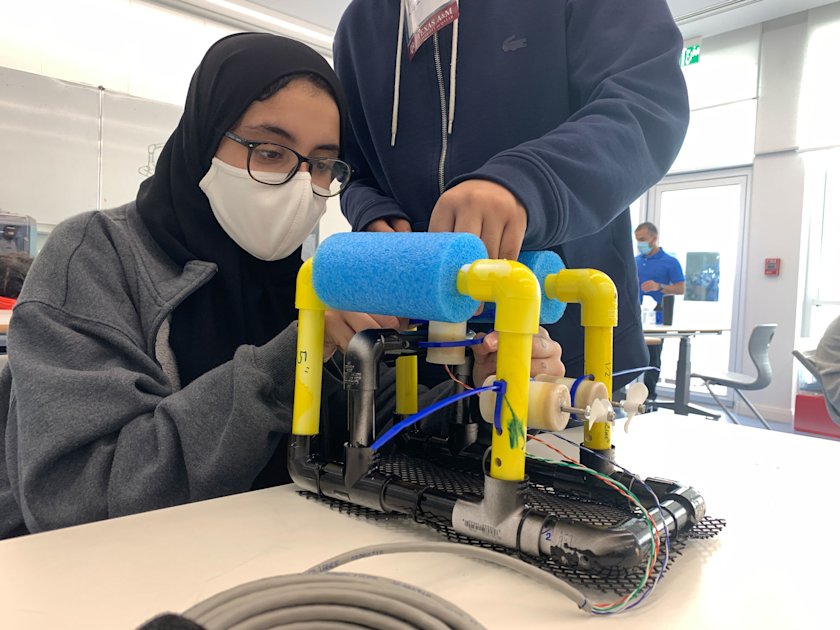
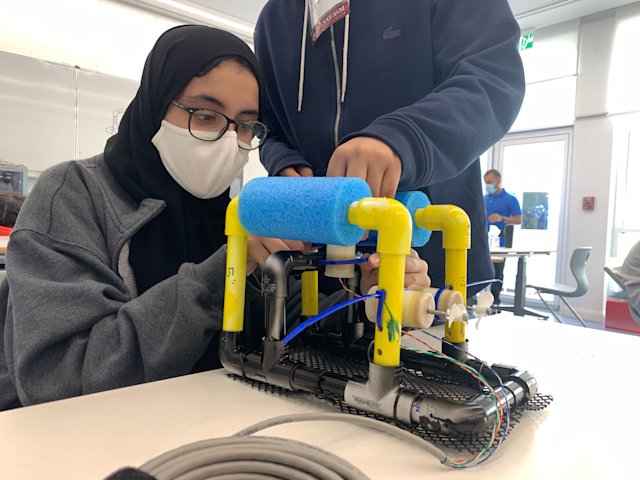
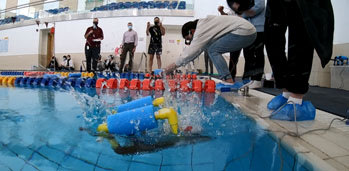

Welcoming the Equestrian World
Across the world, Al Shaqab is known as a center of equine and equestrian excellence, which is why top riders descend on Doha every February for one of the QF member’s flagship events.
85 competitors from 27 countries – and 138 horses – showcased their skills at the Commercial Bank CHI AL SHAQAB Presented by Longines 2021, with Omar Al Mannai, Commercial Manager at Al Shaqab and the event’s director, saying: “Once again, this amazing event has attracted globally respected champion riders and horses to Doha.
“They love to compete at Al Shaqab, and it shows in the number of riders who keep returning for the event.”
As soon as the CHI AL SHAQAB applause ended, Al Shaqab was back into action – hosting the first competition of the 2021 Longines Global Champions Tour, the world’s leading showjumping competition, the very next weekend.
And as Khalifa Al Attiya, Executive Director of Al Shaqab, said: “These popular equestrian events are testament to Qatar’s position as an international sports destination, and its ability to host world-class events despite the challenges posed by the COVID-19 pandemic.”
Across the world, Al Shaqab is known as a center of equine and equestrian excellence, which is why top riders descend on Doha every February for one of the QF member’s flagship events.
85 competitors from 27 countries – and 138 horses – showcased their skills at the Commercial Bank CHI AL SHAQAB Presented by Longines 2021, with Omar Al Mannai, Commercial Manager at Al Shaqab and the event’s director, saying: “Once again, this amazing event has attracted globally respected champion riders and horses to Doha.
“They love to compete at Al Shaqab, and it shows in the number of riders who keep returning for the event.”
As soon as the CHI AL SHAQAB applause ended, Al Shaqab was back into action – hosting the first competition of the 2021 Longines Global Champions Tour, the world’s leading showjumping competition, the very next weekend.
And as Khalifa Al Attiya, Executive Director of Al Shaqab, said: “These popular equestrian events are testament to Qatar’s position as an international sports destination, and its ability to host world-class events despite the challenges posed by the COVID-19 pandemic.”
These popular equestrian events are testament to Qatar’s position as an international sports destination
The Commercial Bank CHI AL SHAQAB welcomed:
- 85 competitors from 27 countries
- 138 horses
